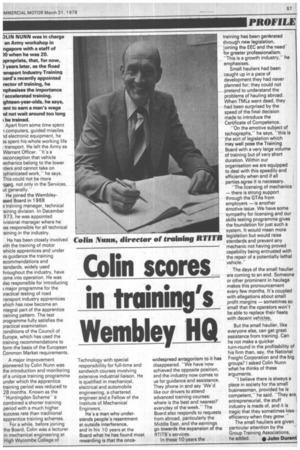Colin scores in training'
Page 49

If you've noticed an error in this article please click here to report it so we can fix it.
Wembley H
DLIN NUNN was in charge an Army workshop in ngapore with a staff of )0 when he was 20. ppropriate, that, for now, ) years later, as the Road -ansport Industry Training Dard's recently appointed rector of training, he nphasises the importance f accelerated training. ighteen-year-olds, he says, rant to earn a man's wage id not wait around too long I be trained.
Apart from some time spent 1 computers, guided missiles ld electronic equipment, he as spent his whole working life I transport. He left the Army as Warrant Officer. "It's a iisconception that vehicle iechanics belong to the lower rders and cannot take on Dphisticated work,' he says. This could not be more
frppg, not only in the Services, ut generally."
He joined the Wembleyased Board in 1968 S training manager, technical aining division. In December 973, he was appointed ivisional manager where he /as responsible for all technical -aining in the industry.
He has been closely involved vith the training of motor rehicle apprentices and under us guidance the training ecommendations and tandards, widely used hroughout the industry, have :ome into operation. He was ilso responsible for introducing major programme for the )ractical testing of road .ransport industry apprentices rvhich has now become an ntegral part of the apprentice :raining pattern. The test programme fully satisfies the practical examination conditions of the Council of Europe, which has used the training recommendations to form the basis of the European Common Market requirements.
A major improvement pioneered by Cohn Nunn was the introduction and monitoring of a unique training programme under which the apprentice training period was reduced to 28 months. Known as the "Huntingdon Scheme" it combined a shorter training period with a much higher success rate than traditional apprentice training schemes.
For a while, before joining the Board, Colin was a lecturer. in mechanical engineering at High Wycombe College of Technology with special responsibility for full-time and sandwich courses involving extensive industrial liaison. He is qualified in mechanical, electrical and automobile engineering, a chartered engineer and a Fellow of the Institute of Mechanical Engineers.
He's a man who understands people's resentment at outside interference, and in his 10 years at the Board what he has found most rewarding is that the once widespread antagonism to it has disappeared. "We have now achieved the opposite position, and the industry now comes to us for guidance and assistance. They phone in and say 'We'd like our drivers to attend advanced training courses; where is the best and nearest?' everyday of the week." The Board also responds to requests from abroad, particularly the Middle East, and the earnings go towards the expansion of the RTITB's services.
In these 10 years the training has been generated through new legislation, joining the EEC and the need for greater professionalism. "This is a growth industry," he emphasises.
Small hauliers had been caught up in a pace of development they had never planned for; they could not pretend to understand the problems of hauling abroad. When TMLs went dead, they had been surprised by the speed of the final decision made to introduce the Certificate of Competence.
"On the emotive subject of tachographs,he says, "this is the sort of legislation which may well pose the Training Board with a very large volume of training but of very short duration. Within our organisation we are equipped to deal with this speedily and efficiently when and if all parties agree it is necessary.
"The licensing of mechanics — there is strong support through the GTAs from employers — is another emotive issue. We have some sympathy for licensing and our skills testing programme gives the foundation for just such a system. It would mean more legislation but would raise standards and prevent any mechanic not having proved capability being entrusted with the repair of a potentially lethal vehicle."
The days of the small haulier are coming to an end. Someone or other prominent in haulage makes this pronouncement every few months. It's coupled with allegations about small profit margins — sometimes so small that the operators won't be able to replace their fleets with decent vehicles.
But the small haulier, like everyone else, can get great assistance from training. Can he not make a quicker turn-round in the profitability of his firm than, say, the National Freight Corporation and the big groups? I asked Colin Nunn what he thinks of these arguments.
"I believe there is always a place in society for the small businessman, provided he is competent," he said. "Theyare
entrepreneurial, the stuff l industry is made of, and it is tragic that they sometimes lose efficiency when they grow."
The small hauliers are given particular attention by the Group Training Associations, he added. • John Durant






















































































































